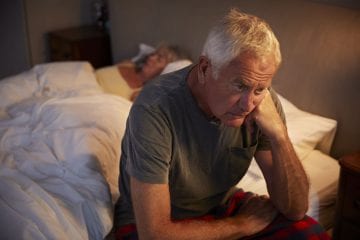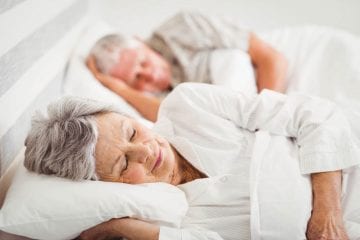How does sleep work? Does everything just stop? Well, sort of. When we are unconscious, the body still functions, and the brain is active. Biologically it’s a complex process, but it helps to feel rested, process new information, and stay healthy.
As we sleep, the brain goes through a five-stage cycle where something different occurs in each. In addition to the first four stages we experience REM (rapid eye movement) sleep. As technology improves, we learn more about each stage and that they can be very different for breathing, heart patterns, brain waves, and even body temperature.
While some stages of sleep will help us to feel full of energy the next morning, others will process information and form memories. Meanwhile we have stages that give our heart and the vascular system a rest, release growth hormones, repair tissues and cells, and increase muscle mass.
We should also note that the sleep cycle will release sex hormones, which contributes to fertility (puberty for teens). By going through this cycle we can stay healthy, prevent sickness, and create the hormones designed to boost the immune system - cytokines.
All sleep stages are essential for a healthy sleep.
Table of Contents
Sleep duration
This is one of the most common questions you’ll find on the internet; how much sleep do we need? There’s no universal answer. It depends on our health, age, lifestyle, and we also have to consider our sleeping pattern. General guidelines suggest that:
- Adults should sleep 7-8 hours
- Teens 9-10 hours
- Children (School) - 10 hours minimum
- Children (Preschool) - 11-12 hours
- Newborns - 16-18 hours.
Once a teenager hits puberty, there’s a change in their biological clock and this is why they are more likely to go to bed later than both adults and children. However, teenagers still need more sleep, so they also tend to stay in bed longer in the mornings. At this stage they still have school and are forced into waking up early after a late night; this is why most teens are sleep deprived.
Another popular question is: can adults still function normally on less sleep? All the evidence points to a ‘no’. However, although there are no studies to suggest that older adults can operate on fewer hours than young people, it’s often the case that they’ll get less sleep or reach the deeper stages of sleep less frequently. Many older adults are awakened with little effort.
If you take one thing from any guide regarding sleep, it’s that the number of hours you sleep isn’t important alone. The quality of sleep is just as important. Even if you slept for eight hours, it might not be enough if your sleep was interrupted and you weren’t able to reach the deeper stages of sleep.
Do you get enough high-quality sleep? Answer these questions and you might find the answer:
- Do you have difficulty concentrating at work during the day?
- Do you have trouble getting up in the morning?
- Do you find yourself dozing in the early afternoon?
If you answered ‘yes’ to these questions, you should be working on improving your sleep quality.
The side effects of poor sleep
Unfortunately there’s more to feeling tired when it comes to sleep deprivation. As we’ve seen, it can affect concentration at school/work, reduce performance, and even impact your ability to memorize, react quickly, and make clear decisions. Accidents are more prominent in people with sleep problems.
Poor sleep may lead to swift changes in mood and irritability causing problems in relationships. For adults the irritability and bad decisions can lead to problems in families. For teenagers and children it can break down relationships with parents and siblings.
Elsewhere there are plenty of studies that suggest that sleep has an impact on our physical and mental health. When we lack sleep, or high quality sleep, our risk of the following increases:
Other risks include a deficiency in the hormones that help children to grow and adults to build muscle mass, repair cells, and fight infections. Sleep deprivation magnifies the effect of alcohol. After drinking too much in the evening a person who is tired will feel the effects more than a person who is well rested.
The stages of the sleep cycle
Before we look at improving your sleep we need to understand how it all works. Sleep can be broken down into two sections; nonREM and REM sleep. When we initially fall asleep, it starts with nonREM sleep and then moves to REM for a brief period. The cycle repeats itself throughout the night.
There are four stages of nonREM sleep and each one aids the body differently. The first stage slows the brainwaves, allowing us to move into the deeper stages of sleep.
After around 90 minutes we fall into REM sleep (the fifth stage). As our eyes move rapidly from one side to the other (hence the name), this is where we experience dreams, paralysis of the limbs, and an almost normal heart rate. As we keep going through the sleep cycle, the REM stages last longer. They can eventually reach an hour at a time. In an average night an adult will experience five to six REM stages.
Deep sleep and REM sleep are probably the most critical of all sleep stages (though all are important). During these stages the restorative functions take place and allow us to wake up in the morning feeling energized.
Sleep hormone - melatonin
Often called the ‘sleep hormone’, melatonin is produced naturally by the body. It allows the body to slow down in preparation for sleep. The body has a circadian rhythm that controls when we wake, sleep, and even eat. Things other than melatonin will affect sleep, but it has a huge impact on our circadian rhythm.
If you wonder why we feel tired much earlier in the winter, it happens because our bodies sense the darkness outside and start to produce more melatonin. As soon as the body senses light, melatonin production shuts down and we wake up to take on the day ahead.
For people experiencing sleep problems there are some effective melatonin supplements that can be bought over the counter. By encouraging the production of melatonin these supplements will attempt to get your sleep-wake cycle back to normal.
Of course, there might be side effects to these supplements, so a discussion with your doctor is highly advised. If your doctor agrees with its use, the melatonin supplement can also reduce tinnitus and heartburn, so it has an added benefit.
Getting better sleep
Although it may sound simple, one of the most effective methods of improving sleep is giving yourself more time to sleep. By going to bed earlier and establishing a routine for the morning and night you’re more likely to improve your sleep habits.
If you want to boost productivity from sleeping more, you might also want to avoid caffeine after mid afternoon. Exercise is a great way to tire the body (as long as you aren’t exercising too late in the day!).
Other tips are:
- not drinking alcohol before bed
- not napping after 3pm
- avoiding nicotine
- removing all technology and distractions from your bedroom
- avoiding large meals late at night
- finding a way to relax before bedtime (this could be a bath, listening to music, meditation, or reading)
- increasing your exposure to sunlight during the day (important for people who work from home)
- keeping the room cool
- If you can’t sleep after 20 minutes, get up and do something to relax.
If you’ve tried all the tips above and still encounter problems, we recommend making an appointment with a doctor. If you have sleep apnea or insomnia, these conditions need to be treated. In serious cases you might get a prescription for sleeping aids or even take part in a sleep study to help diagnose the problem.
For people who do shift work we understand that getting good sleep is even more difficult. We recommend:
- Limiting caffeine intake to the first part of your shift
- limiting the shift changes to help the body clock adjust to one or the other
- increasing the available time for sleep (and taking a nap)
- removing all light and sound distractions from your room during daytime sleep
- investing in blackout curtains
- keeping the lights bright at work.
Treating sleep problems
Short-term sleep problems are normally resolved with over-the-counter treatments and lifestyle changes. Professional help will be necessary for chronic sleep issues. The treatment you’ll receive will depend on the type of disturbances you are experiencing, the underlying problem, and whether this condition is old or new.
As well as lifestyle changes the doctor will consider medical treatments. In the most severe cases surgery may be required. Let’s look at some of the most common treatment options.
Natural sleeping aids
For people who want to avoid medication there are some natural alternatives.
- Valerian - is actually sold as a dietary supplement. This plant extract has helped many people with insomnia, but this hasn’t been proven through research yet.
- Melatonin - as a hormone designed to assist the sleep-wake cycle in the body, melatonin is another dietary supplement that has a history of helping the sleep deprived.
- Lavender - for many years people have used lavender aromatherapy to get better sleep. Extracts of this beautiful purple flower also come as a supplement.
Researchers are continually looking for natural ways to aid sleep and a simple search online will bring up many other suggestions for you to try.
Sleeping pills
Although not suited for long-term problems due to the risk of over-reliance, some people are able to relieve their short-term issues (such as stress and jet lag) with sleeping pills. Most OTC solutions are designed to regulate the sleep-wake cycle. Offering antihistamines in low doses, examples include Benadryl, diphenhydramine, Unisom (doxylamine succinate), and Aleve PM.
As well as the OTC solutions doctors may prescribe:
- Rozerem (ramelteon)
- Sonata (zaleplon)
- Restoril (temazepam)
- Ambien (zolpidem)
- Ambien CR (zolpidem extended release).
Since the risk of dependency is even higher with prescription drugs, it’s important to keep an open dialogue with your doctor.
Guided meditation
If you’ve never tried meditation, it’s essentially the idea of focusing on a specific objective or thought. Though it can be a little awkward at first, most people are able to relax through meditation which makes it the perfect exercise to perform before sleep.
Rather than going it alone, various tapes, podcasts, audiobooks, and YouTube videos will allow you to follow hypnotherapists, therapists, and other experts. These days we can also look to mobile apps for help. People who prefer human contact can team up with instructors for one-to-one sessions.
Therapy
While on the topic of therapists, insomnia and other sleep disturbances can be resolved with CBT (cognitive behavioral therapy). By working with a specialist you might be able to identify problems and correct invasive thoughts (or any other issues preventing your precious sleep!).
Hypnosis
What does hypnosis offer? Well, it’s a way to get the mind and body to relax. Especially after a long hard day full of stress it helps in your preparation for sleep. In some cases it can even be employed to reduce the symptoms that come with IBS (irritable bowel syndrome), chronic pain, and other health conditions.
In order to enter this state of deep relaxation and focus you’ll need the verbal cues of a trained hypnotherapist. They can make deep sleep more accessible by training you to respond to certain suggestions.
Essential oils
If you like to play around with essential oils, we have three that could help your sleeping habits.
- Clary Sage - may boost relaxation and help the body to release all tension.
- Lavender - deserves another mention in this guide since the essential oil may help the nervous system, encouraging more restorative sleep. This is exactly why many sleep-related products will contain lavender in some capacity.
- Blends for sleep - combine lavender, chamomile, spruce, and other essential oils that have relaxing properties.
Sleep anxiety
Have you ever been lying in bed while your mind races with all the things you have to do the next day, week, month? It is perhaps not a surprise to hear that anxiety and stress are two of the biggest factors of insomnia and other sleep disorders. As well as finding it difficult to fall asleep, anxiety can make restful sleep unattainable.
On the flip side, people with sleep problems can generate anxiety. You sit all evening worrying about going to bed just in case sleep doesn’t come your way. If this is an occasional problem, we recommend trying lifestyle changes. Something simple like a walk during the day can work wonders, as can limiting technology an hour before going to sleep. If your head is spinning with ideas and tasks, write a to-do list and try to clear the mind.
When the sleep problem happens every single night, this is where a chat with a doctor is required. S/he might suggest CBT, sleeping aids, and other solutions.
Sleep regression
At the four-month mark people with babies may notice that their child starts to awaken at night. Though frustrating, it is common and often called ‘four-month sleep regression’. Some babies don’t sleep through the night and nap less during the day.
To manage this issue try to tire your baby out during the day; allow them to explore and engage with their environment. Feed them well because some babies will forget to eat while exploring their new world. A full belly can help them sleep longer. Finally, remove all light from their bedroom (they’ll be more likely to go back to sleep after waking!).
Summary
We wish you luck in resolving your sleep problems whether in yourself, a partner, a child, or even a baby. Try our advice and don’t hesitate to visit the doctor if it’s starting to affect your day-to-day enjoyment of life!



